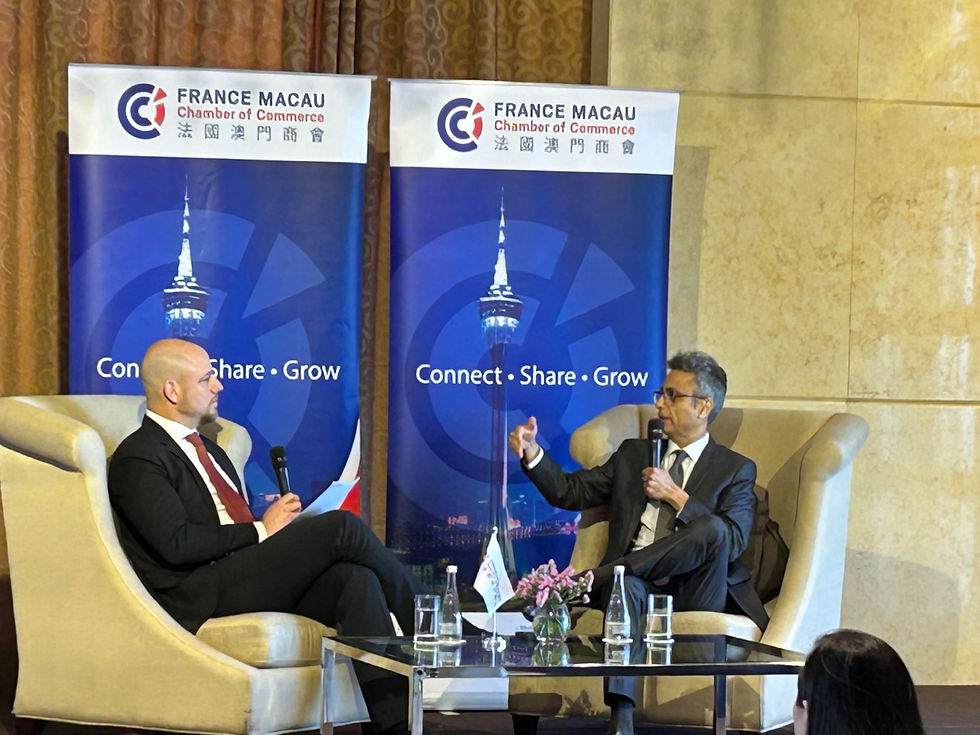Macao Business: Protracted full recovery expected, operators’ profitability ...
- Alidad Tash

- Feb 23, 2023
- 3 min read
Protracted full recovery expected, operators’ profitability to return sooner – Gaming expert
José Carlos Matias
Macao Business
February 23, 2023
Gaming consultant Alidad Tash predicts that it will take six to nine years for the city’s gaming revenue to reach the 2019 tally, when casinos raked in MOP292 billion (US$36.5 billion). However, gaming operators’ profitability is set to be brought to pre-pandemic levels in a matter of two to four years, according to the managing director of 2NT8 Ltd consultancy, who spoke at a breakfast talk held on Wednesday by the France Macau Chamber of Commerce (FMCC) at Sofitel Macau At Ponte 16.

“It’s going to take a few years. Probably seven, eight, nine years for the gaming revenues to match 2019”, indicated Tash, a former senior casino executive, before stressing that gaming operators will most likely see their EBITDA (earnings before interest, taxes, depreciation and amortization) earlier. “The casinos will likely go to the same profitability as in 2019 in 2026/27”, he said during a lively FMCC Breakfast Talk Rendez-Vous on “Macau and the State of Asian Gaming”, which followed a talk show format, with FMCC Executive Committee member Jeremy Artan as the host.
In the short term, the city’s core industry will face a litmus test in the coming couple of months regarding the pace of the recovery.
Premium challenges
While acknowledging that the post-reopening market situation over the past one and a half months “has exceeded everyone’s expectations”, Alidad Tash points to the potential challenges facing the premium mass and premium direct segments.
The gaming expert was referring to the segment above the mass market and below VIPs and the house-managed VIPs, respectively. “What I see is great news on the mass side”, he noted, while adding, “What I’m worried about is that premium mass, premium direct that are more of a question.” Here, the crux of the question lies in two major potential hurdles, he pointed out.
These high rollers “used to come to Macau maybe 25 times a year, twice a month easily before”. That same gambler after a three-year absence would have probably been granted a visa to come to the SAR in January, he exemplifies. However, the question is: How soon will he be back? Alidad Tash quoted reports of several of those added value gamblers stating they would only be back in May. “The frequency of them coming to the city is a key issue.”
Another issue regards “how they are going to bring the money”, considering the cross-border capital flow controls and the crackdown on underground networks of financial in the mainland over the past three years. “The underground network that used to work with junkets also facilitated the flow of money.” With the curbs on outflows of capital and the crackdown on the city’s junket industry, which culminated in the arrest and trial of the SAR’s top gaming promoters (Suncity and Tak Chun), and the across-the-board tighter control by authorities on gambling, it remains to be seen how and when revenue will return to its pre-COVID heyday.
January 2023 saw gross gaming revenue reaching MOP11.6 billion (US$1.4 billion), 52.5 percent of January 2020.
Earlier this week, brokerage J.P. Morgan said that Macau’s daily gross gaming revenue last week stood at around MOP400 million (US$49.5 million), calling it “the best non-holiday print” in over three years. The figure represented over a 45 percent recovery compared with pre-COVID levels.
Regarding the full-year figure for 2023, Alidad Tash anticipates that the industry is set to attain between 40 and 55 per cent of the 2019 levels.
Reversing expat exodus? Not so fast
The FMCC talk also addressed challenges related to competition in the Asian region and the push for non-gaming businesses and the road to attract more non-Chinese patrons. Of the MOP108 billion (US$13.5 billion) pledged by operators for the new concessions term, “about two-thirds relate to already allocated projects that would have come online anyway,” while “one-third relates to truly incremental” investments, Tash said. Increasing international visitation and patrons is another key requirement under the new 10-year concessions. “It sounds very good, but based on what we could see so far, with the major exodus of expats over these three years, many of those who left were people that were more likely to speak English.”
The bottom line is “with English-speaking skilled people leaving Macau, how are we going to service those coming from Korea, Japan, and other countries who don’t speak Chinese?” With the reopening and economic recovery, expat professionals may again flock to the city. However, “not to the same level as in the past,” Tash anticipates, as he quoted the increased competition to attract global talents posed by other jurisdictions such as the United Arab Emirates or Qatar.
Another problem is “a lot of the expats I know were mistreated by the government, by immigration authorities, and IPIM (Macau Trade and Promotion Investment Institute).” On top of this, there is a problem related to the city’s “reputation of what went on during zero-COVID.”
_edited.png)
Comments